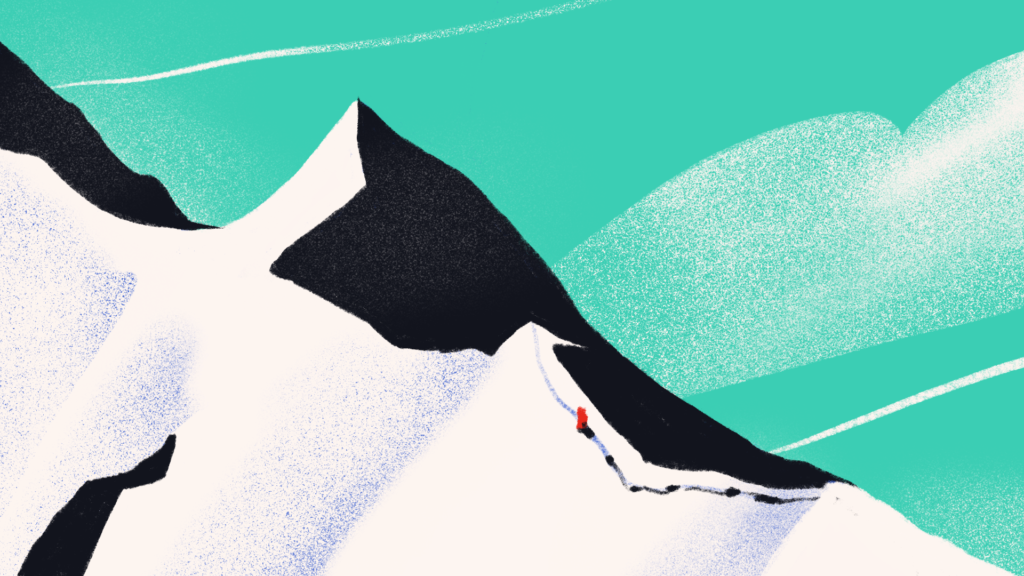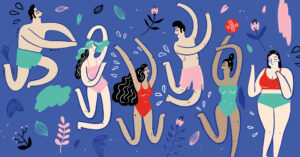“What you think to be the peak is nothing but a step.” Imagine finding this quote by Seneca; not in a chocolate box nor in a self-help book, but on top of the Dufourspitze, 4634m, the highest point of Monte Rosa, second highest point in Western Europe. And imagine finding it after 5 days of mountaineering and climbing 15 other 4000m-peaks; and imagine accomplishing this suffering from a form of arthritis called Ankylosing Spondylitis (AS). This is the journey Judith Safford shared with us on TEDxZurich stage in 2017. We are now curious and excited to discover where Judith’s steps led her since then.
JS- The first immediate step after my mountain journey was the TEDx talk. This huge project, besides being an enormous boost of confidence, was also a personal coming out; in some ways a frightening one, with many implications. Suddenly you admit to being “different”: Would telling people you have a chronic disease make it more difficult to find a job? Or get certain types of insurance? How would people react?
Many people suffer from chronic conditions and most do not talk about them or actively hide them. But if you feel forced to hide behind a so-called “norm” rather than be the person you are, it stops you from being your authentic self. It reinforces social norms that hide the wonder of diversity and disempower or even harm those hiding behind them. Learning compassion and acceptance of people that don’t fit the “norm”, such as the chronically ill, is important to increase tolerance and understanding.
Moreover, the TEDx talk was also the first time I publicly raised awareness about my belief that there is not enough research into rheumatic diseases. During the past three years I’ve therefore been fundraising, given talks on the subject and I am starting an organization with some colleagues engaging for more research into rheumatic and musculoskeletal disorders: it will be called RheumaCura.
IM- As the journey is the destination, how important is setting personal goals?
JS- I do set goals. If you dream or have a vision without setting goals, it stays a dream or a vision. The words of Seneca really helped me to realize that -yes- it’s a series of small steps; often the goals we have in life seem impossible to reach, too big, too frightening: but by breaking them down into steps, you can actually climb the mountain. It even applies to the tax declaration: if I manage to do 10 minutes a week, by June I’ll be finished!
IM- In your talk, all the images could be read as metaphors and yet are so concrete: ice, mountains, rocks. A human being with a very vulnerable human body turns towards nature. What does nature mean to you?
JS- Nature on earth is a complete wonder: it is an incredibly balanced system of unbelievable complexity, where the result is perfect and beautiful. There’s spirituality in that. Whilst being in nature, I also feel how completely insignificant we are as Egos with our personal issues: I find that kind of reassuring. Becoming aware that we are totally irrelevant to the bigger picture, makes me feel safer.
So, yes, going into nature is essential for my well being. I grew up in London, but I always felt it, always sought after nature, even as a child. Must be somewhere in my genes!

IM- “Matterhorn down below us, and over there, the Mont Blanc the only point in Western Europe higher than us” and “the Lyskamm ridge, literally like being on a knife edge”: these two images really struck me!
JS- The first part was more about victory: I climbed the second highest peak in Europe and -you know- everyone makes a fuss about the Matterhorn, but it’s below me now. (laughs)
What matters to me more is the image of the Lyskamm and the idea of being on a knife edge. With chronic disease I often experience myself being there, on a knife edge: you are always balancing the different medications with the side effects, thinking how much can you work, how much sport can you do, how much rest you need, and so on.
Last year, I gave another talk (“A Patient Journey: living with Arthritis”) where I extensively talk about these crucial decisions.
I take medication which helps to contain the arthritis. However, it also suppresses a messenger in my immune system, which is thought to be important in preventing cancer. In 2019 I was treated for breast cancer and the recommendation after treatment was to stop taking the arthritis medication. I felt very strongly that I was on a knife edge, where I had to make a choice between stopping the immune suppressants, with the probability that the chronic arthritis would flare up again, or continuing with the treatment, meaning that a part of my immune system is suppressed, which may protect me against cancer.
Many people with chronic illness have several conditions to balance and are often faced with such decisions, where no solution is really optimal, and there are no research results available to make an informed decision. Such life decisions imply choices with consequences that may not always be favorable. In the end, it is always a balancing act.
IM- Chronic disease / current pandemic: is there a parallel in how one should approach them?
JS- Certainly, to me there are parallels. All of us face a balancing act at the moment during the pandemic. If we open up too much, the virus will come back; and if we don’t open up, mental health illness resulting from anxiety, loss and loneliness, undiagnosed diseases such as cancer, due to treatment delays and the collapse of the economy, will have even bigger consequences for health and well-being than Covid-19. Decision-makers are on a knife-edge, too.

IM- Any idea you would like to share or see shared by TEDxZurich?
JS- I’ve learnt so much from talking about my health conditions and coming into contact with other affected people. I feel that I’ve learned empathy, open heartedness and greater acceptance towards things that I cannot change, but also I engage more for things that I think should change. My dream is to see a movement in health care that puts patients at centre stage. Specifically, I want to see medical research in which the benefits for patients’ are more clearly top of the agenda. In many areas this is still not the case. The medical world is multifaceted and driven by many different interests – this diversity is important for the creative process, but in the final instance it is about the welfare of patients. Commercially funded research is conducted by dedicated individuals, but the outcomes ultimately serve the interests of the company and its shareholders. Publicly funded research is often driven by what scientists believe is interesting, rather than by consulting patients to find out what they think is important.
I know of no industry other than health, where the end-consumers are so rarely consulted, although at a practical level they know more about their condition than anybody else. We patients rarely contribute to the research process. Patients are essential to clinical trials, but with what justification are they excluded from knowing the results? If I participate in a clinical trial, I want to be treated as a partner, and not as an object without rights beyond the choice to participate or not. In recent years, a movement for change has developed, and this is recognized by doctors, researchers and industry. But the pace of change is slow and so much patient knowledge is still untapped. If patients were empowered to participate more actively in decision-making about their own healthcare, we would be on the path to create the health system where caring for the patient is always at the centre of efforts, and healthcare is ultimately driven not by profit and prestige, but by love and compassion.
Finally, I love coincidences and here’s one for you: the idea of delivering a TEDx talk was suggested to Judith by one of our former TEDx Zurich speakers, Thomas Rippel, whom she met on a mountain hike, also happens to be the first of our “past speakers’ series” interviewee with “Can this bullsh*t still save the world?”.
Last but not least, Judith writes a blog, too: arthritisandme.ch
Please, have a look at it: you will find so much strength, courage, compassion, and overall grace.
What a journey: thank you so much, Judith!





